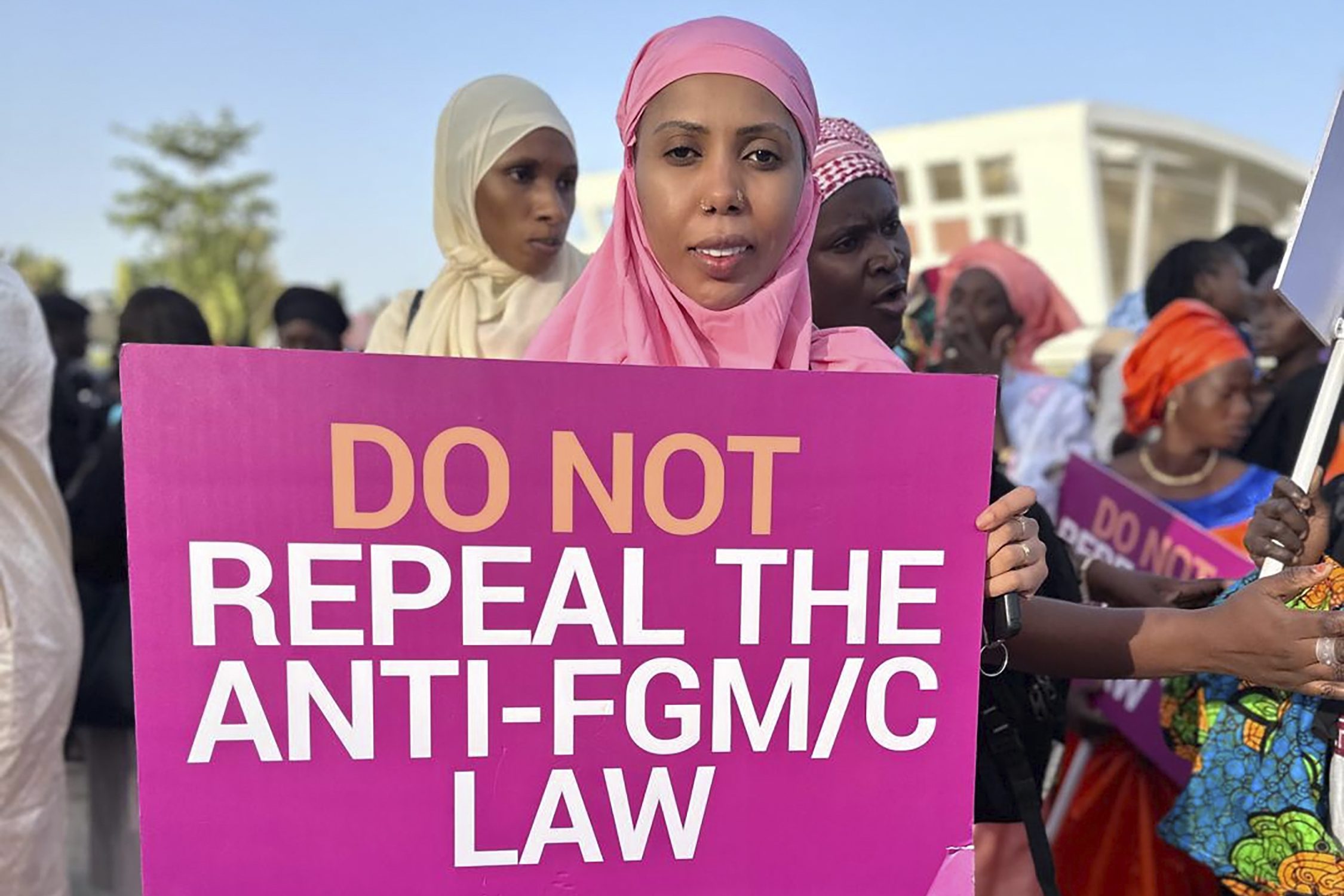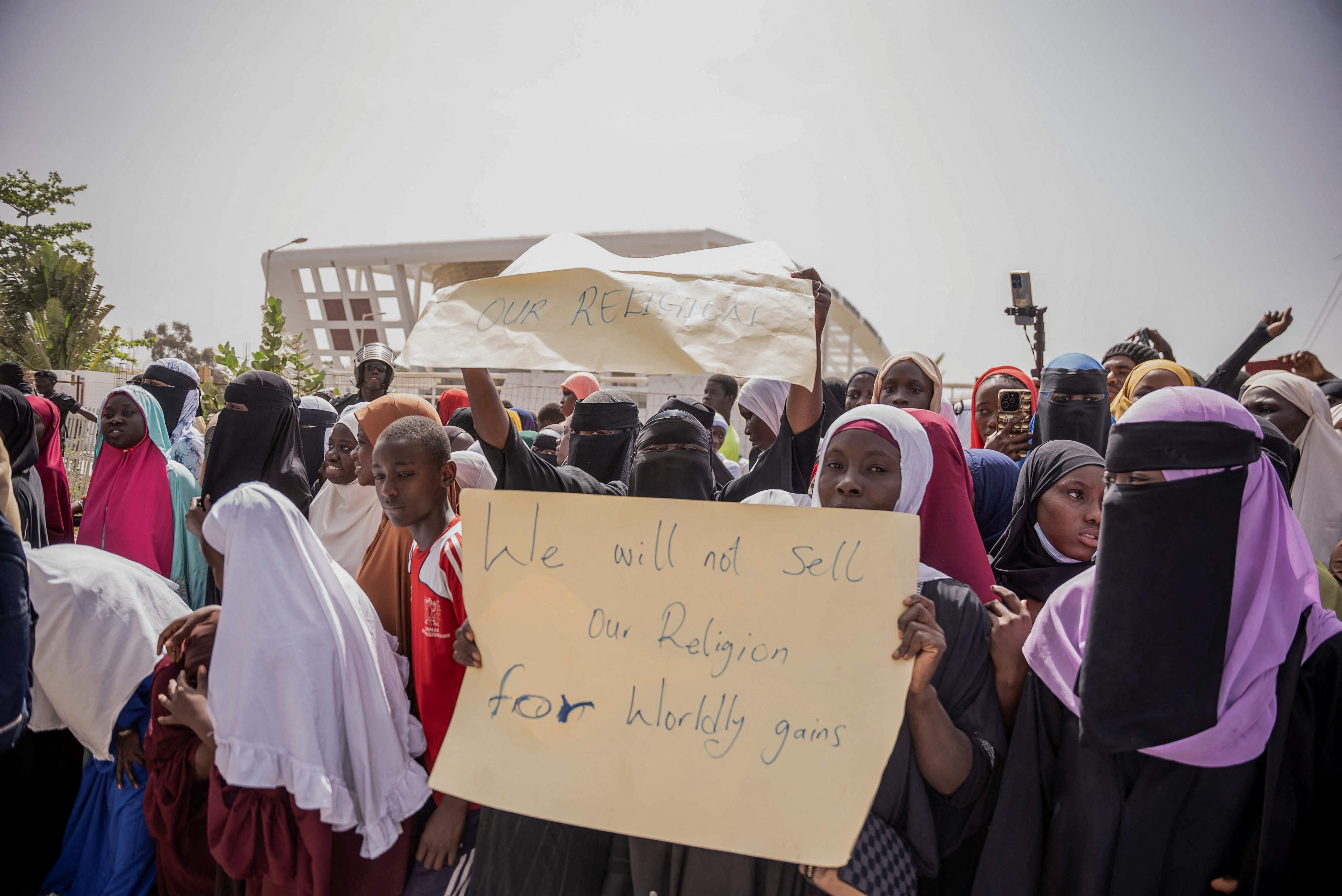Women's Rights & Issues
Related: About this forum'Over my dead body', say Gambian mothers amid efforts to lift FGM ban
‘Over my dead body’, say Gambian mothers amid efforts to lift FGM ban
As politicians take steps to repeal a law criminalising female circumcision, women stand firm to shield the next generation from the harmful practice.
 ?resize=770%2C513&quality=80
?resize=770%2C513&quality=80
Women picketed outside the Gambian parliament in Serrekunda while legislators voted to reverse a ban on female genital mutilation [File: Hadim Thomas-Safe Hands for Girls via AP]
By Kaddy Jawo
Published On 28 Mar 202428 Mar 2024
Banjul, The Gambia – Fatou* was barely a year old when she underwent female circumcision, the practice also called female genital mutilation that rights groups condemn as a form of abuse.Today the 29-year-old from Bundung, a town on the outskirts of The Gambian capital Banjul, says she will shield her baby daughter from the same fate that scarred her, even as parliament takes steps toward lifting a ban on FGM. Sitting in her kitchen preparing suhoor, the early morning meal before the start of the fasting day in the Muslim month of Ramadan, Fatou shared the story of the pain and lasting trauma she says FGM inflicted. “When I got married, my husband and I faced days of agony,” she said, her words heavy with the weight of memory. “We could not consummate our marriage because I was sealed.” That was just part of the torment it brought into her life. She finally fell pregnant, but then faced immense difficulty giving birth to their nine-month-old. Standing firmly by Fatou’s side, her husband is a beacon of support, echoing his wife’s determination to break the cycle of suffering. But not all women have been as fortunate.
Sarata* is a 35-year-old mother of two daughters – a three-year-old and a 15-month-old. Because of her circumcision, childbirth was also a harrowing experience. Watching the pain she went through made her husband a vocal voice against FGM. But while Sarata was pregnant with their second child in 2022, her husband died tragically in a road accident, leaving her to raise their daughters and fight for their future by herself. In the makeshift shop she runs in Brufut, a village in the West Coast Region, 23km from Banjul, Sarata talked about the lasting consequences FGM has had on her life. “What do they want?” she asked, her voice trembling in anguish. “Men, supporters of this barbaric practice, what do they seek to gain?” she continued, her children playing near the detergents, brooms and secondhand goods she had on display. “I lost my husband, but not his resolve against FGM. We swore to protect our girls, but if the ban is lifted …” her voice faltered, before rising with newfound strength. “Over my dead body will I let them suffer as I did.”
 ?w=770&resize=770%2C514&quality=80
?w=770&resize=770%2C514&quality=80
Women protest The Gambia's plan to reverse ban on FGM
Gambians protest to keep a law criminalising FGM from being repealed [File: Malick Njie/Reuters]
Defending girls’ rights
In 2015, the Gambian parliament took the historic step to pass the Women’s (Amendment) Act of 2015, which criminalised FGM and made it punishable by up to three years in prison – a significant shift after years of advocacy. But recently, on March 18, politicians voted 42 to 4 to advance a controversial new bill which would repeal the landmark FGM ban if it passes following further consultation and expert opinion from specialised government ministries. Almameh Gibba, the legislator who introduced the bill, argued that the ban violated citizens’ rights to practise their culture and religion. “The bill seeks to uphold religious loyalty and safeguard cultural norms and values,” he said. However, rights organisations say the proposed legislation reverses years of progress and risks damaging the country’s human rights record.
. . . . .
 ?w=770&resize=770%2C514&quality=80
?w=770&resize=770%2C514&quality=80
Women’s rights campaigners emphasise the need to educate men about the consequences of FGM, as many still support the practice [File: Malick Njie/Reuters]
 ?w=770&resize=770%2C514&quality=80
?w=770&resize=770%2C514&quality=80
Even with the law against FGM in place, many in The Gambia continue the practice in secret [File: Malick Njie/Reuters]
Even after the 2015 law went into effect, the practice continues in secrecy, inflicting silent suffering on innocent victims like 34-year-old Sarjo* and her four-year-old daughter.
 ?w=770&resize=770%2C514&quality=80
?w=770&resize=770%2C514&quality=80
Supporters of a bill aimed at decriminalising FGM see the practice as an important part of their culture [File: Malick Njie/Reuters]
. . . .
However, rights activists and many survivors of the practice remain concerned.
At her home in Bundung, Fatou gazed at her nine-month-old, seeing a future full of promise and possibility, but one that may now be more at risk.“I dream of a world where my daughter can grow up without fear,” she whispered, her fingers tracing the outline of her daughter’s tiny hand. Sarata, too, shares similar fears. She sees the prospect of the law being repealed as a chilling nightmare that casts a dark cloud over the future of Gambian girls. For her daughters playing beside her, each laugh and smile is a testament to the hope that flickers within them, and a reminder of the reason Sarata is fighting to keep the ban in place: “They are my heart, my soul,” she said.
Video Duration 02 minutes 22 seconds 02:22
Source: Al Jazeera
https://www.aljazeera.com/features/2024/3/28/mothers-fight-to-protect-daughters-as-the-gambia-considers-unbanning-fgm